Fearful money, or as we like to refer to it as ‘hot money’, is capital that a trader has a strong emotional attachment to. In other words, it is money that one CANNOT afford to lose, and therefore, should not really be using it to trade the markets with. An example of hot money is one’s rental funds or grocery budget.
You may not know this, but trading with hot money has an incredibly detrimental effect on your trading.

Trading with hot money
Attempting to justify the use of funds needed for living expenses is a catastrophic mistake! Almost in all cases, the emotional impact will not only adversely affect your ability to pin down high-probability trading opportunities, it’ll also affect how you actually manage the trades. According to the late Mark Douglas, author of The Disciplined Trader, the fear of losing one’s fortune is every bit as intense as the fear of losing one’s life.
It’d be challenging to find a better analogy than this!
How can hot money affect your ability to trade?
Maintaining a neutral mind-set is crucial in this business. In fact, it is perhaps one of the key elements that can determine whether one succeeds or not. For the most part, you need to be at a complete ease when trading. Worrying about the outcome of the next trade, or the next five trades, is NOT how professional traders operate. Unfortunately, this is precisely what you’ll be doing should you trade with hot capital.
Assume for a moment that you have been having success trading with a small live account, which is funded using ‘cold money’ – essentially the opposite of hot money. Your trading strategy is simple to follow and your bottom line is steadily increasing. If you were to increase the account’s value with hot money, you will likely begin second guessing perfectly valid setups. You may even begin hesitating and not pulling the trigger when you’re supposed to. It can also, as briefly mentioned above, affect the way you manage your trades. You may, given the risk associated with hot money, close winning trades out too early and give losing trades the space to run.
Trading with cold money
An easy way to determine if you’re trading with cold money is to imagine that you lost all of the money in your account. Would it affect your standard of living or wipe out your entire life savings? If the answer is no, then you’re probably trading with cold funds. If you answered yes, however, then you may want to reconsider your account size. While we understand that no one likes to lose money, hot or cold, the point we’re trying to get across here is that the emotional connection to your account value will be far less gripping if you trade with cold money.
A cool, yet conservative, way of building an account funded with cold money is to construct a ‘ladder’. What we mean by this is simply start by investing an amount of capital that you feel is cold. From that point, only add funds (again preferably cold money) to this account once you’re able to establish some consistency. This helps build one’s confidence.
An example of the ladder formation could be a $500 account to begin with, which will only be increased ONCE the bottom line shows a 10% gain. This could take a month or a year. It does not matter. If 10% is your target and this has been achieved, you’re then permitted to add additional funds. This can be continued until you’ve attained a satisfactory account. This way, you’re building your account in a controlled manner using only cold money.
In closing…
To trade successfully, you not only need to have a well-defined trading plan and methodology, you also need to reduce fear to a level where it is considered healthy. To put it another way, you need to respect the reality of risk but not let your judgement be impaired by FEAR. Trading with cold capital will help position you in this state of mind.
[wpi_designer_button id=23298]




